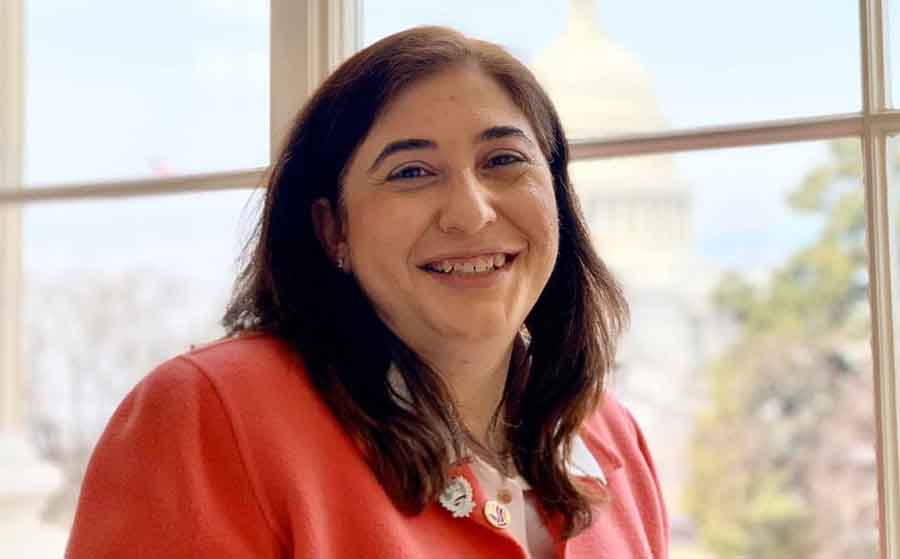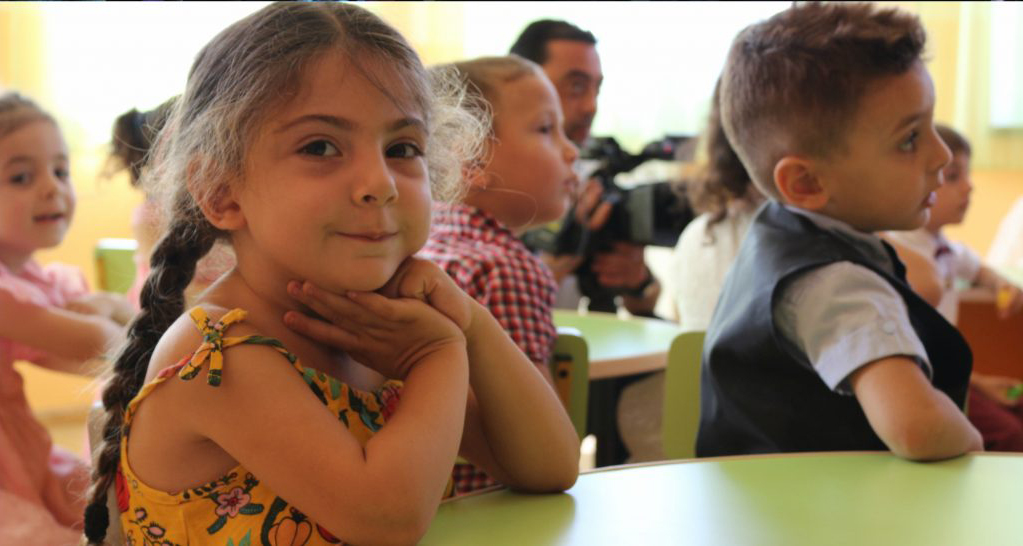The Armenian Relief Society: 110 Years Strong and Relevant – Interview With ARS Central Executive Board Chair Dr. Nyree Derderian

By Pauline Getzoyan
The year 2020 welcomes the 110th anniversary of the Armenian Relief Society (ARS), as well as a new threat to the Armenian community by way of COVID-19. The Armenian Weekly recently sat down with ARS Central Executive Board Chair Dr. Nyree Derderian to discuss the society’s continuing relevance and importance to the Armenian nation, both in the homeland and the diaspora.
Armenian Weekly (A.W.): The ARS is celebrating its 110th anniversary this year. How do you view the continuing importance of the society from its inception to the present day?
Dr. Nyree Derderian (N.D.): The Armenian Relief Society has evolved with every turning point, with every generational change. It is still as relevant today as it was in 1910. The challenges have shifted, yet there is a continuing need for the ARS to serve our people. The ARS continues to empower women in its ranks to not only be leaders within their own families, but also gives them the necessary knowledge and resources to become leaders in their communities and to advocate for Armenian and humanitarian causes. It is important that the ARS continue for generations to come, so that the society continues to serve our people when they need it most.
A.W.: What programs do you consider of particular importance, both past and present, in the diaspora and in Armenia, Artsakh and Javakhk?
N.D.: Our entities have programs which are coordinated locally and are vital to their communities. Each entity has programs serving youth, senior citizens, immigrants and social needs; to name the importance of them all would take up an entire issue. Allow me to focus on a few.

The ARS Akhuryan Mother and Child Clinic was established as a hospital in 1997 and expanded in 2005 with additional housing for the birthing center. The center was opened on April 24 in response to the need for healthy births in the Shirak region of Armenia which was devastated by the 1988 earthquake. Today there have been over 17,000 healthy births at the center with a zero percent maternal mortality rate. The center has proven to operate with the highest standards and to assure the comfort of our patients who are giving a new generation hope. In January 2017 the ARS launched a program to support the births of 2nd and 3rd female newborn to impede sex selective abortions; the program includes education for the families.
The “Sose” Kindergartens of Artsakh were first launched in 1998 in Stepanakert; currently the ARS partially funds eight kindergartens throughout the republic. Initially they were created for the offspring of soldiers who perished during the Artsakh War. However today they serve the general population of Artsakh and are some of the brightest steps for a future for those who attend.
The sustainability of the Armenians in Javakhk still remains pertinent to date. The ARS is continuing to foster the Armenian communities through various programs, such as our three youth centers in Akhalkalaki, Ninotsminda and Akhaltsikhe. We are currently working on broadening the scope of programs to include micro business to empower women and teach rug weaving and needle work.

The newest addition to the ARS programs in Armenia is “HOM Arvest” which was created in 2018. The concept of the program isn’t new; it is in fact a tradition that started as early as the First Republic in 1918 and carried out in diaspora communities such as Syria and Lebanon. “HOM Arvest” has a dual purpose: first, it is an opportunity to teach women handy work and second, it gives an opportunity to bring those items to market and for the women to earn a living.

A.W.: As the oldest Armenian women’s organization in the world, does the ARS have a specific agenda in mind for the coming year and beyond?
N.D.: The Board’s focus for this term is sustainability, to sustain our organization and membership, and to further educate and strengthen our current members, empowering them to continue to answer the call to action that is set forth by our organization. Our membership is the greatest grassroots force; one phone call to a region ignites a call to action and the unattainable becomes feasible. Without the members of the ARS it would cease to exist. Another priority is to sustain fundraising and adopt new modalities that are used in other organizations to strengthen our financial base. Finally, it is our focus to sustain and develop new programs to further our reach of humanitarian aid for our people.
A.W.: Recently in Gyumri, a woman and her 13-year-old daughter were beaten, and the woman died from her injuries while her daughter remains hospitalized in serious condition. It appears that the woman’s partner, a 28-year-old man, committed the crime which is under investigation. This certainly is not the first case of domestic violence in Armenia. Given the prominence and high regard of the ARS as the premier Armenian women’s organization, are there any plans for the society to address this issue and become involved in working towards systemic change in Armenian society?
N.D.: First and foremost our hearts go out to the victim’s family members. The ARS is a humanitarian organization comprised of women. In order to make systemic changes in Armenia we need to change the mindset, a mindset that has historically revered women in Armenian society. Women have played an important role in all facets of Armenian society, whether they were pagan goddesses, the main force for Armenians adopting Christianity as our official religion, monarchs, fighting on the battlefields, voting and holding office during the First Republic, or something as simple as being daughters, wives, mothers and grandmothers. Domestic violence is inexcusable and should be prosecuted to the fullest extent of the law; harming one’s wife and mother of your children is maltreatment. We are working to first and foremost educate our own membership on domestic violence. Organized steps need to be taken; a partnership of NGOs needs to be aligned so that civil society and government work hand in hand to first educate the public at large and second suggest policy changes. There are organizations that have been at the forefront of the changing policy against domestic violence. Imagine the possibilities if that number was greater.
A.W.: On a more celebratory note, are there special events in mind for the 110th anniversary?
N.D.: The Central Executive Board had organized the 110th celebration in the homeland to take place from August 30th through September 10th. Due to the Coronavirus (COVID-19) outbreak we are forced to postpone the 110th anniversary events as the health of our membership and supporters is of utmost importance to us. Further information shall be made available as soon as we reschedule.

A.W.: One last question during these extraordinary times. Under the current conditions with COVID-19 in the US and the recent lock down and state of emergency in Armenia, what plans might the ARS have to send assistance in response to needs that arise for our brethren in Armenia and around the world?
N.D.: The ARS sent a shipment containing one ton of medical supplies to Yerevan and Artsakh in coordination with the Office of the High Commissioner for Diaspora Affairs of Armenia and the Ministry of Health of the Republic of Armenia, Armenia Fund USA, Chevy Chase Surgery Center and with the financial support of the Ani & Narod Memorial Foundation. The shipment was coordinated on the ground by Raffi Sarkissian and Chevy Chase Surgery Center and arrived in Armenia on Friday, March 13, 2020 to assist with the needs of our people in the homeland.
The ARS Akhuryan Mother and Child Birthing Center has taken the necessary precautions to protect our patients, and the staff are working around the clock to secure a safe zone within the facility to protect expectant mothers, mothers who have just given birth and newborns.
We join various agencies such as the World Health Organization, Centers for Disease Control and local governments in asking our members to look after the elderly and those in need during this difficult time. While we understand that social distancing is the requirement, a phone call to elderly within our communities, and a friendly voice with a lending hand may be just what they need.
Our efforts continue to secure more medical supplies and equipment, and if anyone is willing to help send more supplies to Armenia and Artsakh please contact us immediately.

